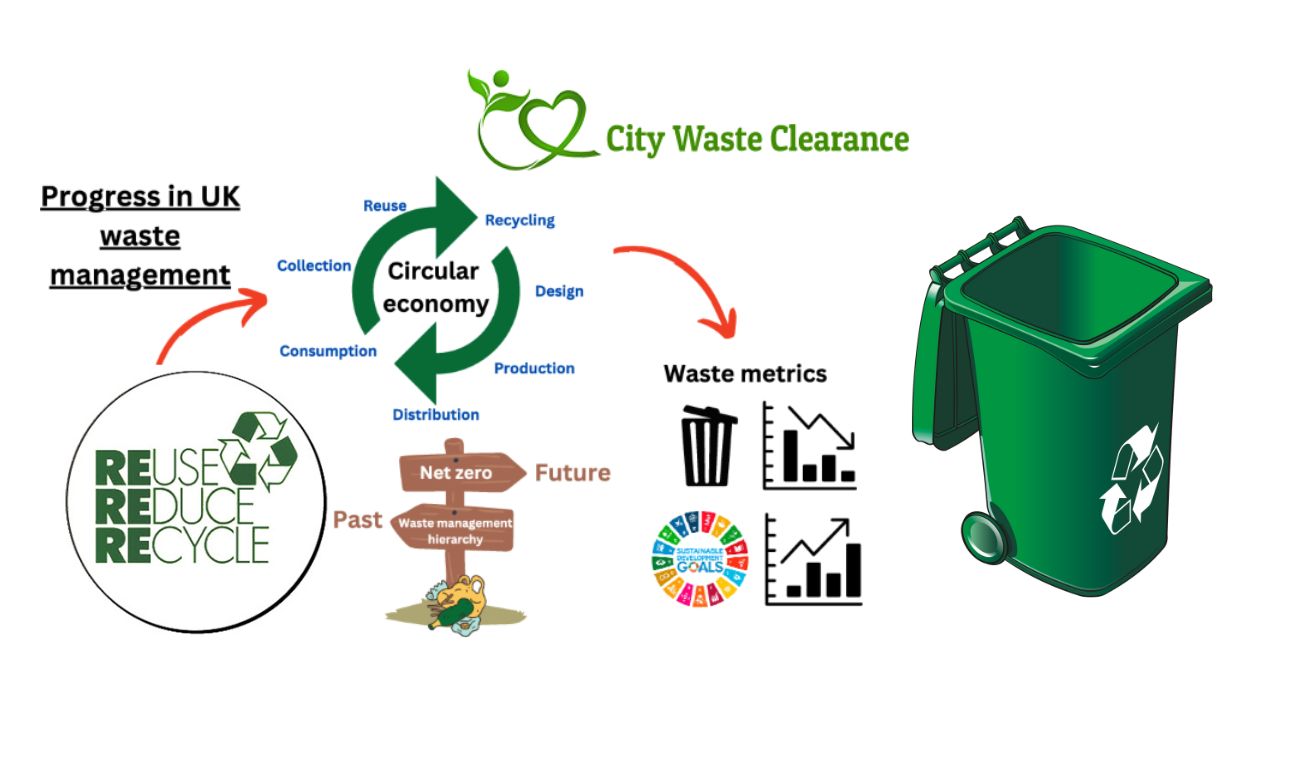What is the waste management process in the UK? The waste management process in the UK includes waste collection, segregation, recycling, and disposal. This system ensures environmental protection and public health.
The UK has a comprehensive waste management system aimed at reducing landfill use and promoting recycling. Local authorities manage waste collection and segregation, ensuring efficient recycling of materials like paper, glass, and plastics. Recycling centers and waste treatment facilities process these materials, converting them into reusable products.
The UK also focuses on waste-to-energy initiatives, turning non-recyclable waste into electricity. Strict regulations govern hazardous waste disposal to prevent environmental contamination. Public awareness campaigns educate citizens on proper waste disposal practices. This multi-faceted approach helps create a sustainable environment and reduces the carbon footprint.
Introduction To Waste Management
Waste management means how we handle our trash. It is very important for our environment. If we do not manage waste well, it can harm our planet. Good waste management keeps our surroundings clean. It also helps to save resources by recycling.
Managing waste helps to reduce pollution. It stops harmful chemicals from getting into the soil and water. Proper waste management also helps to reduce greenhouse gases. This is good for fighting climate change. It also helps to keep our streets and neighborhoods clean. This makes our community a better place to live.
| Type of Waste | Amount Generated (million tonnes) |
|---|---|
| Household Waste | 26.4 |
| Commercial Waste | 41.1 |
| Industrial Waste | 32.8 |
Types Of Waste
Household waste includes things we throw away at home. This can be food scraps, old clothes, and broken toys. Most of this waste goes to landfills. Some items can be recycled, like paper and plastic bottles. It’s important to sort waste properly. This helps reduce the amount of waste in landfills.
Industrial waste comes from factories and businesses and includes chemicals, metals, and plastics. Some of this waste can be hazardous, so proper disposal is crucial to protect the environment. Recycling programs can help manage industrial waste, reducing the planet’s impact.
Collection And Transportation
Local authorities handle waste collection. They organize schedules for homes and businesses. Waste is collected in bins and bags. Special trucks gather the waste. These trucks have separate sections for recycling.
Local authorities also educate people. They teach how to sort waste. This helps in recycling. Authorities also manage recycling centers.
Different areas may have different rules. Always check with your local authority.
After collection, waste is transported. Trucks take waste to processing centers. Some waste goes to recycling plants. Other waste goes to landfills or incinerators.
Recycling plants sort and process materials. Landfills store waste that cannot be recycled. Incinerators burn waste to reduce its volume. Some trucks use eco-friendly fuels to reduce pollution.
Efficient transportation is important. It helps keep our environment clean. Regular checks ensure trucks are in good condition.
Waste Treatment Methods
Recycling helps in reusing materials. It reduces waste and saves resources. Plastic, metal, and paper are common recycled items. Recycling bins are provided in most areas. Items must be clean before recycling. Sorting is important for effective recycling. This makes the process easier and more efficient.
Composting turns organic waste into useful soil. Food scraps and garden waste are composted. It reduces the amount of waste sent to landfills. Composting helps plants grow better. It enriches the soil with nutrients. It is an eco-friendly waste treatment method.
Disposal Techniques
Landfills are large pits where trash is buried. They are managed to reduce harm to the environment. Special liners prevent waste from polluting the soil. Methane gas from landfills is often collected for energy. These sites are monitored to ensure safety.
Incineration burns waste at high temperatures. This process reduces the volume of waste. It also generates electricity and heat. Incineration is a useful way to manage non-recyclable waste.
Future Of Waste Management
Smart bins help sort waste, using sensors to identify items. Robots assist in recycling and separating different materials. Drones monitor landfill sites, helping to track waste levels, and making processes more efficient.
New laws encourage recycling and reduce landfill waste. Taxes limit waste production. Companies pay more if they create too much waste. Grants support green projects and help develop new recycling technologies. Educational programs teach people about waste management and show how to recycle properly.
Conclusion
Understanding the waste management process in the UK is crucial for a sustainable future. By following these practices, we can help reduce environmental impact. Let’s all contribute to a cleaner, greener UK. Making informed choices about waste can lead to significant positive changes for our communities and the planet.


